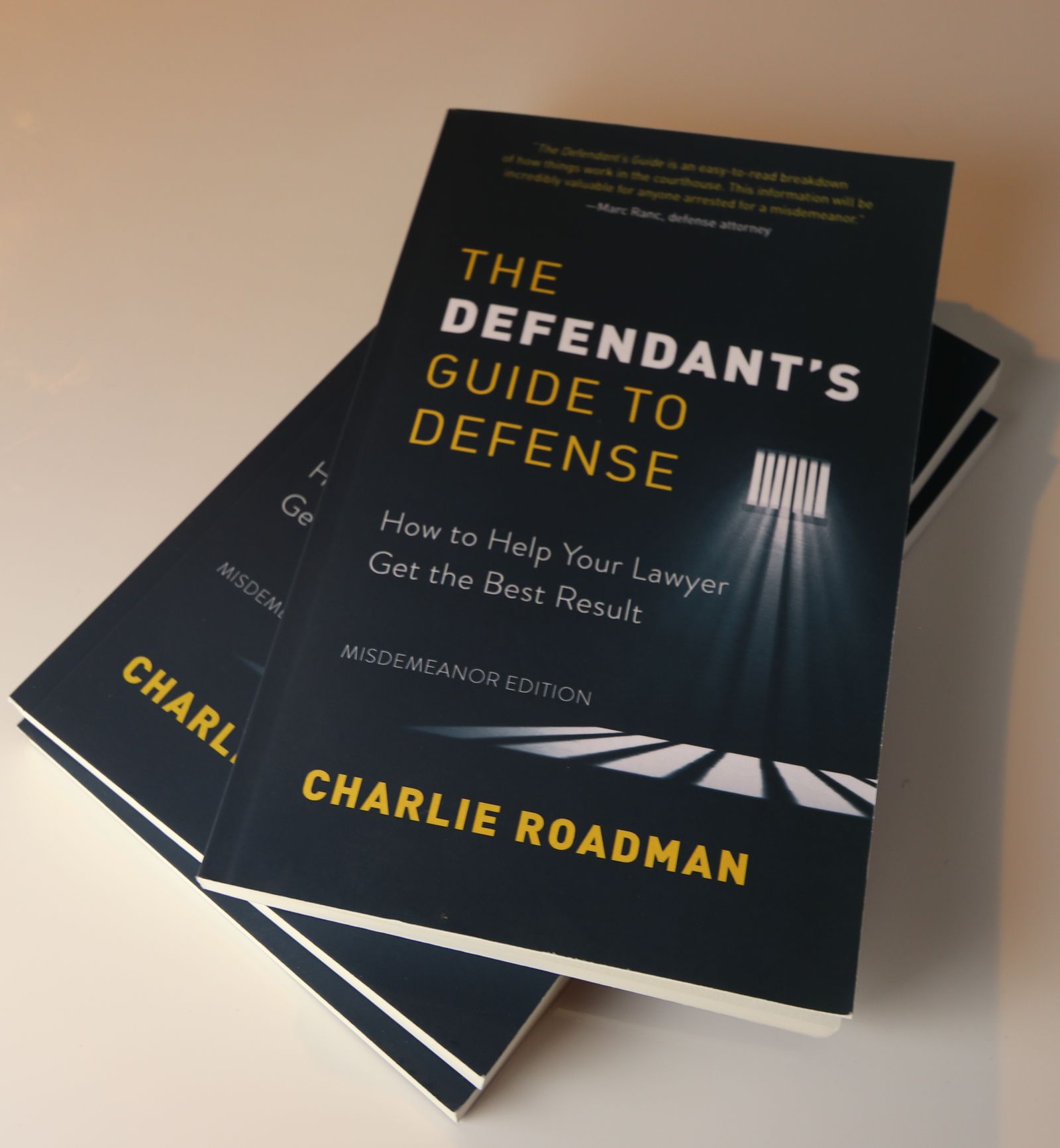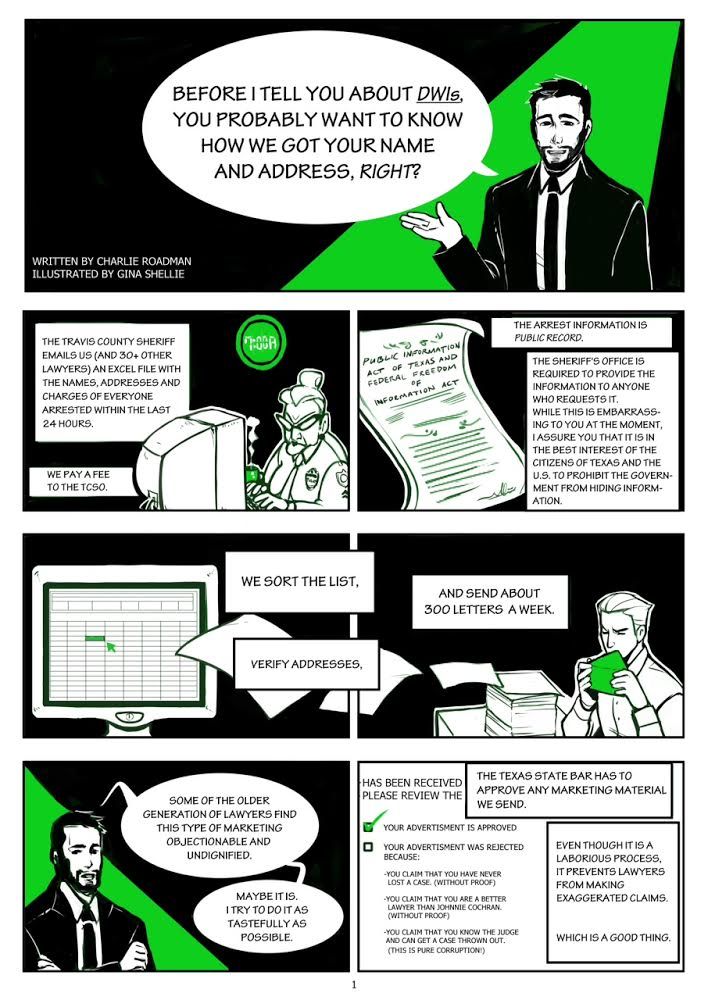12 Hour DWIE Class
Welcome to Austin DWI Charges with Charlie Roadman, Austin Criminal Defense Attorney; practical advice on dealing with an arrest.
Ellen Stader:
Good morning, good afternoon, or good evening; depending on where you are. We are here in Austin, Texas. My name is Ellen Stader. And I'm here with Charlie Roadman, a defense attorney in Austin. Right now, we're going to talk about the ... how many hours?
Charlie Roadman:
12.
Ellen Stader:
The 12 hour DWIE class.
Charlie Roadman:
That's right.
Ellen Stader:
Lay it on us. What's it all about, Charlie?
Charlie Roadman:
All right. Well, the 12 hours ... this is the question everyone ... they're like "12 hours?" But it's four hours over three days.
Ellen Stader:
Okay.
Charlie Roadman:
Okay? And that's by law, actually, the legislature. And the Texas government has created this class. And so you can't do it all in one day. Because people do, they want to get it over with. But it's three days minimum.
Charlie Roadman:
Now, they can spread it out, like Saturday, Sunday, Saturday, or even Monday, Monday, Monday. But it can't be any shorter than three days.
Ellen Stader:
Okay.
Charlie Roadman:
And one-
Ellen Stader:
And the ... Sorry, go on.
Charlie Roadman:
Well, I was going to say one of the reasons I know all about this is I was certified to teach this class.
Ellen Stader:
Aha. Okay.
Charlie Roadman:
And so I've taught this class before. And there's a week long training. And I had a company that offered it, called Athens Education. We don't have that anymore. But for two years I was in charge of running these classes; this one and a 15 hour drug class. But we'll talk about that a different time.
Ellen Stader:
Okay. So you've got intimate experience with the DWIE class.
Charlie Roadman:
I do. I do.
Ellen Stader:
So tell us, from the baseline, what is the point, what is the goal, of taking a DWIE class?
Charlie Roadman:
The point is, Texas wants to educate you enough so that it doesn't happen again. Okay? So that's the-
Ellen Stader:
So that you never get charged with a DWI again.
Charlie Roadman:
Yeah. They want you to come away from that going ... so then, in the future, when you're in some situation that could go the wrong way, part of your brain remembers something you learned.
Ellen Stader:
Mm-hmm (affirmative). You're scared straight from it.
Charlie Roadman:
Yeah. Yeah. You take the Uber, or you don't go out, or whatever it is.
Charlie Roadman:
Yeah. Now, the class though, it's the minimum of basically any DWI in Texas, in any situation, like a first DWI. So I've gotten hundreds and hundreds and hundreds of DWIs dismissed. They all had to take this class. Okay?
Ellen Stader:
Okay. So it's pretty much a requisite for dismissal?
Charlie Roadman:
It's pretty much requisite now, you know?
Ellen Stader:
Mm-hmm (affirmative).
Charlie Roadman:
So the prosecutors will say, on a really good case, "We'll dismiss it if they do the class," or some other things or whatever. And if I come back and go, "No, we're not doing nothing. Dismiss the case," they sort of look at me cockeyed and go, "Well, why don't you try your luck with a jury?"
Ellen Stader:
Why would we do that? Aha. Right. Yeah.
Charlie Roadman:
The only scenario where someone gets arrested for a DWI and doesn't have to do this class, would be something where the police officer, own video, so clearly just says, "I know they're not intoxicated, but I'm going to arrest them anyway."
Ellen Stader:
Right.
Charlie Roadman:
In the history of-
Ellen Stader:
Which is not 100% out of the realm of possibility, but-
Charlie Roadman:
Well, it's funny. It's out of the realm of possibility for the officer themselves to have turned on the video recorder [inaudible 00:03:38]. But what happens is, their colleagues have audio on recording that they don't realize and so they say something. But you-
Ellen Stader:
Ah. So you've seen that happen?
Charlie Roadman:
No, not that. I've seen them say some things that they wish they weren't on camera.
Ellen Stader:
Yeah. For sure. Yeah.
Charlie Roadman:
But no, even the most cynical police officer isn't really just arresting innocent people for fun, you know?
Ellen Stader:
Right.
Charlie Roadman:
So, anyway, that's a whole nother topic.
Ellen Stader:
Exactly.
Charlie Roadman:
Even if you blow under, they arrest you and you blow under the limit, they're going to say, "We want that 12 hour class."
Ellen Stader:
Wow.
Charlie Roadman:
Which, you can say, "I'm not doing it." It just raises the tension in the prosecutors, the case can drag on. But my advice is always: take the class. And the reason is that almost ... I mean, no one wants to do the class.
Ellen Stader:
Of course.
Charlie Roadman:
0% of people want to do the class. But 60 to 70, 80% of people, at the end of it, are like, "You know what? I got something out of it."
Ellen Stader:
Right on. Okay.
Charlie Roadman:
I've definitely had some people that say, "It was stupid." But I thought that was more a judgment on their personality than the class.
Ellen Stader:
And you may see them again.
Charlie Roadman:
Yeah. [inaudible 00:04:58]. Yeah.
Charlie Roadman:
And so, teaching the class, because the state define the curriculum, there're private companies that teach the class, but they have to teach it the same way. Now they have different teachers, of course. So you get a lot of variation in the quality of the teaching-
Ellen Stader:
In the presentation.
Charlie Roadman:
Yeah.
Ellen Stader:
Mm-hmm (affirmative).
Charlie Roadman:
Well, not the presentation, because it's a PowerPoint that the state ...
Ellen Stader:
Oh, I just meant stylistic, like the delivery.
Charlie Roadman:
Yeah. Correct. Okay. So yeah, the materials are all the same. Yes, stylistically, depending on if you have an energetic [HEP 00:05:31] instructor or a sour one, you know?
Ellen Stader:
Right.
Charlie Roadman:
Most of them are going to be enthusiastic enough.
Charlie Roadman:
So these private companies teach it. And at the end of it, you take a test. The test is very easy, it's 25 questions. Except, you wouldn't pass it if you just put your head down and went to sleep. I mean, you got to pay attention to some degree. But you pass the test and they give you a certificate. And you give the certificate to your defense attorney. And the defense attorney gives it to the prosecutor. And in some situations the DPS, the driver's license agency, will get a copy of it if it's necessary.
Charlie Roadman:
Anyway, so you've got this class. One of the things that the class is designed to do is elicit communication from the students. So we'll have people that are just like, "I'm going to go in and I'm not going to say anything. I'm just going to stand here."
Ellen Stader:
"I'm going to sit here. I'm not going to participate."
Charlie Roadman:
Yeah. And that's probably most people.
Ellen Stader:
Sure.
Charlie Roadman:
So it'll be a class of 15 people, all of them sworn they're not going to talk. But the class is designed to get them talking. And one of the first things the instructor will do, would be just like, say, "Well, have you heard of any celebrities having problems with alcohol and drugs?" And then people just go, "Well yeah."
Ellen Stader:
Yeah, it's fun to talk about their problems.
Charlie Roadman:
"Amy Winehouse." Yeah. And then they just start talking. And then, eventually, part of it is you'll go around and tell your story. And that's usually late in the first day. And you hear other people's stories, which is just mind-blowing. You know?
Ellen Stader:
Mm-hmm (affirmative).
Charlie Roadman:
I think you can say, "I don't want to share," at that point. But I think most people, by that time, are like, "Fine."
Ellen Stader:
Are comfortable with it. Yeah.
Charlie Roadman:
Yeah, they just [crosstalk 00:07:27].
Ellen Stader:
And people want to tell their stories.
Charlie Roadman:
They do.
Ellen Stader:
They really do.
Charlie Roadman:
They do.
Charlie Roadman:
Then the instructor talks about how alcohol affects people. And I very commonly hear people say, "I wish this was just a class in high school." They do learn things, that they're just like, "Man ..."
Ellen Stader:
"Had I'd known this before."
Charlie Roadman:
"If I had this data." You know?
Ellen Stader:
Mm-hmm (affirmative).
Charlie Roadman:
And they're things, like just the different percentages of alcohol. And some of these drinks now, these beers are 7% alcohol or something crazy, you know?
Ellen Stader:
Oh, right.
Charlie Roadman:
Because my clients will say, "I just had three of those." And I'm like, "Well, each one of those is two. So that means you had six."
Ellen Stader:
"You had a six-pack."
Charlie Roadman:
They're like, "What?" But anyway, there's some, I say, eighth grade science they teach. And then some general psychology about how the alcohol affects your judgment. Which is something that ... I mean, it struck me ... I mean, I learned, while I was being trained obviously ... but that the very first part of your brain that it affects is the judgment. Okay? And they say it's backwards from when you're born. You're an infant, you develop your motor skills and then your judgment. Alcohol goes the opposite way, it affects your judgment first and then your motor skills. You know?
Ellen Stader:
Wow. Mm-hmm (affirmative).
Charlie Roadman:
And then, if you drink too much, you're like an infant. Right?
Ellen Stader:
Right. Right.
Charlie Roadman:
You're incapacitated.
Ellen Stader:
You have neither.
Charlie Roadman:
Neither, right?
Charlie Roadman:
And that helps. And then, if you drink ... you'll notice it when you have one drink and you look in the mirror, the things you're willing to do have expanded.
Ellen Stader:
Uh-huh (affirmative). That's so true.
Charlie Roadman:
You can see ... Yeah, it's such-
Ellen Stader:
And one of the first things that you want to do is have another drink.
Charlie Roadman:
Oh my gosh.
Ellen Stader:
It sounds like the best idea.
Charlie Roadman:
God, doesn't it just sell itself?
Ellen Stader:
Mm-hmm (affirmative).
Charlie Roadman:
Yeah. Yeah. I say, Einstein, on the third glass of wine, would be doing dumb stuff. Alcohol is very good at doing those kinds of things.
Charlie Roadman:
But the class, so, like I said, no one wants to do it. When they're done, they go, "Ah, reluctantly see that that was valuable." And the class is like 90 bucks. The class is structured, so they're not going to move it an hour because you have some event. You got to do it.
Ellen Stader:
You got to show up. Uh-huh (affirmative).
Charlie Roadman:
I mean, currently, most of them are on Zoom right now.
Ellen Stader:
Right.
Charlie Roadman:
And that's probably going to be slowly moving back to in-person class. But maybe not, who knows?
Ellen Stader:
Or maybe they'll do both.
Charlie Roadman:
Yeah.
Charlie Roadman:
The next level up is a 32 hour class, and that's called the DWI Intervention Program. And that's going to be automatic if you get a second DWI.
Ellen Stader:
Oh, okay.
Charlie Roadman:
Or, if, during the first one, when they do an evaluation of you, they discover that you've got a serious, serious problem, then they can say, "Do the DWI Intervention," right off the bat. But if you present as a fairly normal, use the minimum, and what they'll do is the 12 hour class.
Ellen Stader:
Gotcha. And is that also affected by ... how do I say this? If you just got pulled over, nothing else happened, you didn't run up on a curb or get into a shouting match with another driver while you're on the road or something like that. Are those accelerated circumstances that-
Charlie Roadman:
Yeah. The facts of the case will affect it a little bit. But mostly, the evaluation process which is done through Travis County, it's called TCCES, Travis County Counseling Education Services, where they interview you, it costs $55, it's a couple hours. And then they have this menu and they check off the classes.
Charlie Roadman:
The facts of the particular case aren't as controlling about which classes they choose as your history. Right?
Ellen Stader:
Oh, okay.
Charlie Roadman:
It could be your first DWI, but you've got three public intoxication charges in the past, or one-
Ellen Stader:
Right. Clearly that's a problem.
Charlie Roadman:
Yeah. Or one POCS or controlled substance drug use, you know?
Ellen Stader:
Mm-hmm (affirmative).
Charlie Roadman:
So they're going to look mainly at the history, and then also what you answer. And I always tell people that, "I can only advise you to be truthful." But sometimes people share things, that they go, "Well, now you got to take the higher level class." You know?
Ellen Stader:
Right.
Charlie Roadman:
Which is, I think, ultimately, it kind of stinks for the clients that have to take more than they would've if they weren't honest. But I am a fan of these classes, you know?
Ellen Stader:
Mm-hmm (affirmative).
Charlie Roadman:
I mean, they're not great. It's not a Harvard level type of quality of education. But some of them really improve people's lives.
Ellen Stader:
Which is the bottom line.
Charlie Roadman:
Bottom line. And You can't design something that works 100% of the time. But if it works 35% of the time, that's great. So, yeah, that's the 12 hour class.
Ellen Stader:
The 12 hour DWIE class. If you've got a DWI, it's the least you can do.
Charlie Roadman:
It is the least.
Charlie Roadman:
Now, one other question, is that, some people, they want to move so quickly that they take the class within a week of getting arrested. And that's fine. The only thing that doesn't help, is if you took the class before you were arrested. Right? So anything post-arrest is going to help, and you're not going to have to take the class twice.
Ellen Stader:
Oh, okay.
Charlie Roadman:
Okay?
Ellen Stader:
Okay.
Charlie Roadman:
Unless you get arrested again, then you might have to do something. But you know what I mean?
Ellen Stader:
Yep.
Charlie Roadman:
You can do it a week later, you can do it three months later; depending on how your case is moving.
Charlie Roadman:
And like I said, there's six or seven different companies and they have different times. Some of them are Monday morning, Tuesday morning, Wednesday morning.
Ellen Stader:
Wow. Mm-hmm (affirmative).
Charlie Roadman:
Most of them are weekends. So probably 90% of them are structured Friday night, 6:00 to 10:00. Saturday, noon to 4:00. Sunday, noon to 4:00.
Ellen Stader:
Right. Yeah.
Charlie Roadman:
That's a fairly common one. If that doesn't work in your schedule, they do have some during the week.
Ellen Stader:
Options, just to spread it out.
Charlie Roadman:
Yeah.
Ellen Stader:
Yeah. Right on. Well, you heard it here. If you get a DWI and you ... Actually, no, here's a question. How do people find these classes once they're-
Charlie Roadman:
Okay. So the Travis County, the education people that evaluate you, will give everyone a list of the current eight to 10 companies. But you can also just Google it: Travis County DWIE class, 12 hour class. My website has where they all are. And so, you can find them.
Charlie Roadman:
The one thing that you can't do is ... well, this is right before the pandemic, people were trying to find to do it online. Because you didn't used to be able to do it on Zoom. And there are some sketchy websites that say, "Court-ordered classes guaranteed to be accepted," and they're not. So it really-
Ellen Stader:
If they have to say it's guaranteed, you know it's not.
Charlie Roadman:
Right. So it's the 12 hour DWIE class. It's a Texas certified thing. So you can always ask me or your attorney, whoever it is. But, yeah, you can't just find an alternative, this is a specific class for Texas.
Ellen Stader:
Right. Okay.



